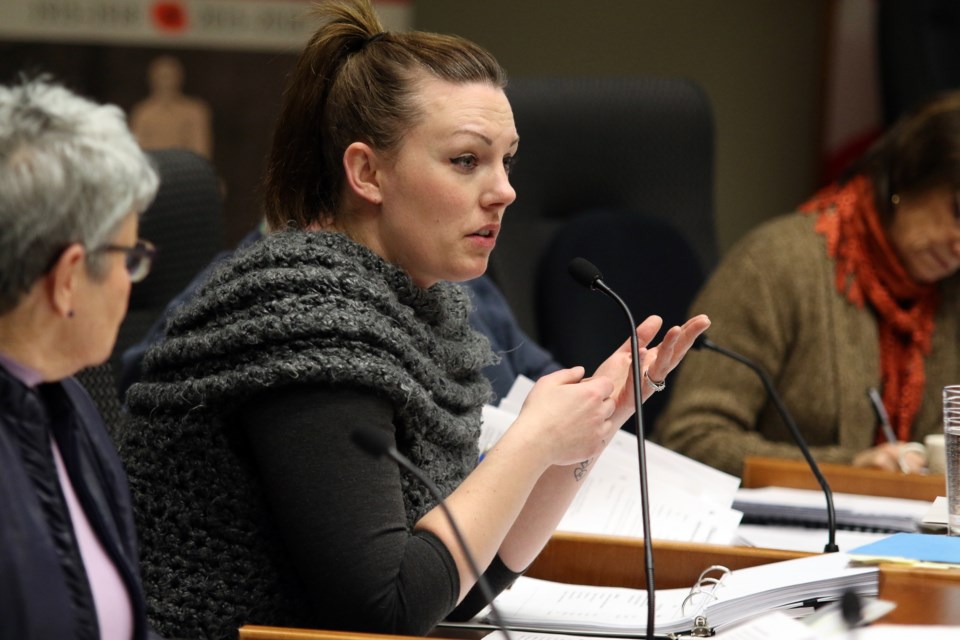THUNDER BAY – An effort by some Thunder Bay city councillors to crack down on drug trafficking prompted a tense debate at city hall Monday.
Coun. Aldo Ruberto wants the city to pursue creating a nuisance bylaw to arm police and municipal bylaw officers with more tools to disrupt what he calls “drug houses.” It would set stiffer penalties to address complaints he says are typically associated with drug trafficking, like excessive foot traffic, poor property maintenance, and unpleasant smells.
But Coun. Shelby Ch’ng raised red flags over the proposal, fearing it could be used to criminalize poverty and mental health issues, and said it could contribute to discrimination against Indigenous people.
“We need to be very careful how we use our systems against the poor and oppressed,” she warned. “This is what systemic racism looks like.”
Both viewpoints found support around the council table. Ruberto’s motion to study the creation of a nuisance bylaw passed, but only after a successful amendment from Ch’ng that will see it reviewed by the city’s Anti-Racism and Respect advisory committee, drug strategy implementation panel, and Thunder Bay police.
Councillors painted the issue in stark terms, saying drug trafficking was terrorizing some city neighbourhoods.
“We have a battle on our hands in the city of Thunder Bay,” said Coun. Albert Aiello. “We get these news updates all the time on all the things that happen in our community.”
Ruberto said he’d become determined to address the problem after attending community meetings in the Dease/Ogden area last year.
“Their concerns were unbelievable when it came to drug houses, prostitution – it was heartbreaking,” he said. “A lady got up and spoke about [how] four bullets were shot next door to her. She has four children. One of those bullets could have gone through the wall. Why do they have to put up with this?”
Coun. Brian Hamilton said he’d seen the problem first-hand in the city’s east end, and while he supported harm reduction efforts for those facing addiction, people living near drug traffickers and some disruptive drug users also needed the city’s support.
“There are seniors in my ward afraid to leave their house, [people] afraid to let their kids play in the yard,” he said. “Who’s standing up for them?”
“Everybody’s standing up for the drug users – and that’s great, we want to end the stigma and help people. I think that’s an important part of the conversation, and it better be reflected in this bylaw. But someone has to take some responsibility for the thousands of seniors, children, and families that are negatively impacted by some of these illicit operations.”
Ruberto’s motion included few details, but the councillor maintained other communities have used nuisance bylaws to crack down on drug trafficking. Thunder Bay currently has a small number of nuisance provisions contained within its property standards bylaw. He wants to see those updated and expanded into their own bylaw, with harsher penalties and enforcement mechanism.
The motion contained no explicit references to drug trafficking or drug houses, leaving Ch’ng concerned some councillors had heard about the intent of the bylaw only through media coverage.
“It seems to be that there’s two messages here,” she said. “One is [that it’s] for nuisance, which seems fine. But when I was sent the Tbnewswatch article Councillor Ruberto did, it seemed completely different.”
Ruberto suggested he had developed the proposal informally along with councillors Aiello, Hamilton, Oliver, and You.
“I don’t think the community is in 100 per cent agreement with it, because I’ve received phone calls and emails about this particular motion,” said Ch’ng. “This is what I’m hearing from the community: on the heels of one of the largest protests we’ve seen in the city of Thunder Bay, Black Lives Matter, council’s first response is more police authority, more police power – those were the words of councillor Ruberto.”
Ch’ng feared the bylaw could be used to make unfounded complaints against Indigenous residents. She added that poor property maintenance can be a sign of poverty or mental health issues, not necessarily drug trafficking.
“I’m concerned this report can be used as tool to keep the poor oppressed,” she said.
The concerns prompted a backlash from Ruberto.
“This is so important, and it’s being twisted,” he said. “This has nothing to do with race, this has nothing to do with poverty. Drugs don’t care about your race, they don’t care about your economic status.”
“I’m hearing, ‘wait a minute, let’s take it easy, because the police are going to use this as a tool against poor people’ – because that’s what the police want to do, that’s on their agenda,” he said sarcastically.
“The police are human beings – stop this! They’re not all racist, they’re human beings that are trying to help people, and they’ve been doing that. They’ve changed a lot in the last couple of years. But we keep talking about race. This is not a race issue, this is about drugs – about people getting killed, addicted, ruining lives. Focus on that.”
Coun. Andrew Foulds said he’d support exploring the possibilities of a nuisance bylaw given Ch’ng’s amendment, but cautioned that problems of addiction went too deep to be meaningfully addressed by tweaking municipal rules.
“I don’t think we should be under any illusions that a bylaw is going to turn the switch on the mental health and addictions problems in this community,” he said.
City administration is set to report back on the possibility of a nuisance bylaw by Sept. 28.
